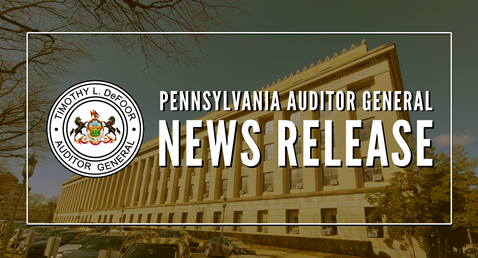Auditor General DePasquale Discusses ‘High-Impact Audits’ at 2017 National Auditors’ Conference in Nashville, Tenn.
Focuses on positive changes from untested rape kits special report, ChildLine audit
Auditor General DePasquale Discusses ‘High-Impact Audits’ at 2017 National Auditors’ Conference in Nashville, Tenn.
Focuses on positive changes from untested rape kits special report, ChildLine audit
Printer friendly press release
NASHVILLE, TN (Aug. 15, 2017) – Auditor General Eugene DePasquale today told participants at the National Association of State Auditors, Comptrollers and Treasurers’ 2017 annual conference that government audits can contribute to quality-of-life improvements.
Joined by Kentucky Auditor of Public Accounts Mike Harmon, DePasquale focused on the positive changes brought about as a result of his 2016 audit of ChildLine, the state’s child-abuse hotline, and his September 2016 special report on Pennsylvania’s backlog of untested rape kits.
“Both the ChildLine audit and untested rape kit special report have produced verifiable changes with the potential to make a monumental difference in people’s lives,” DePasquale said after the conference. “I enjoyed the opportunity to share with other state auditors how our work can have a big impact and bring about positive results for the general public.”
Untested rape kits
Since releasing the special report in September 2016, DePasquale has continued to advocate for enough resources and funding to accurately count Pennsylvania’s rape kit backlog and to test all kits in a timely manner.
For example, in January 2017, he helped 12-year-old Williamsport resident Madison Wertz launch a national Change.org petition calling for all states to provide funding to test their rape kits and upload all usable DNA data into the FBI’s federal database known as CODIS. That petition has received more than 100,600 signatures in about eight months.
In May 2017, DePasquale was pleased to learn that the newly mandated annual Department of Health (DOH) report on the rape kit backlog showed not only a decrease in the number of backlogged kits — from about 1,900 to about 1,200 — but also a huge jump in the participation rate by local law enforcement agencies.
“Getting more law-enforcement agencies to respond was a crucial step in ensuring Pennsylvania has an accurate picture of the backlog,” DePasquale said. “An accurate count is the foundation on which every other part of the process to test these kits rests.
“Also, the decrease in backlogged kits means that 700 Pennsylvanians received answers about their rape kits,” DePasquale continued. “This result is one of the reasons I have been highlighting this issue for the last year: Sexual assault victims deserve justice, and testing the kits provides them a chance for justice and a chance to continue the healing process.”
In addition, the Pennsylvania Chiefs of Police Association’s Pennsylvania Law Enforcement Accreditation Program commissioners followed one of DePasquale’s recommendations and now mandate that local law enforcement agencies comply with the requirements of the Sexual Assault Testing and Evidence Collection Act (Act 27 of 2015) to qualify for accreditation or re-accreditation.
ChildLine
In May 2016, DePasquale issued an interim audit report after finding more than 42,000 calls to ChildLine went unanswered in 2015.
“Because of that interim report, the Department of Human Services implemented numerous changes that have had a measurable impact on ChildLine’s ability to function as it should,” DePasquale said. “I was very pleased that DHS acted swiftly to improve the myriad problems that were leaving at-risk children in potentially dangerous situations.”
The interim report highlighted four significant matters:
- 22 percent of all calls in 2015 went unanswered,
- ChildLine was constantly understaffed in 2015,
- Nearly one-third of all calls received in 2014 and 2015 were not tracked or documented, and
- Supervisors monitored an extremely small number of calls — only 7, or 0.005 percent — in 2015.
The interim report also made eight recommendations to correct these deficiencies, all of which DHS quickly implemented.
The final report, issued in October 2016, included eight findings and 24 recommendations for continued improvement. As of September 2016, the unanswered call rate was down to 2 percent, according to DHS.
“DHS needs to remain vigilant and proactive in addressing problems that arise at ChildLine,” DePasquale said. “When we’re talking about the safety of Pennsylvania’s children, there can be no hesitation in doing what’s right.”
The untested rape kits special report is available online here, the interim ChildLine audit report is available here and the final ChildLine audit report is available here.
# # #
Return to search results